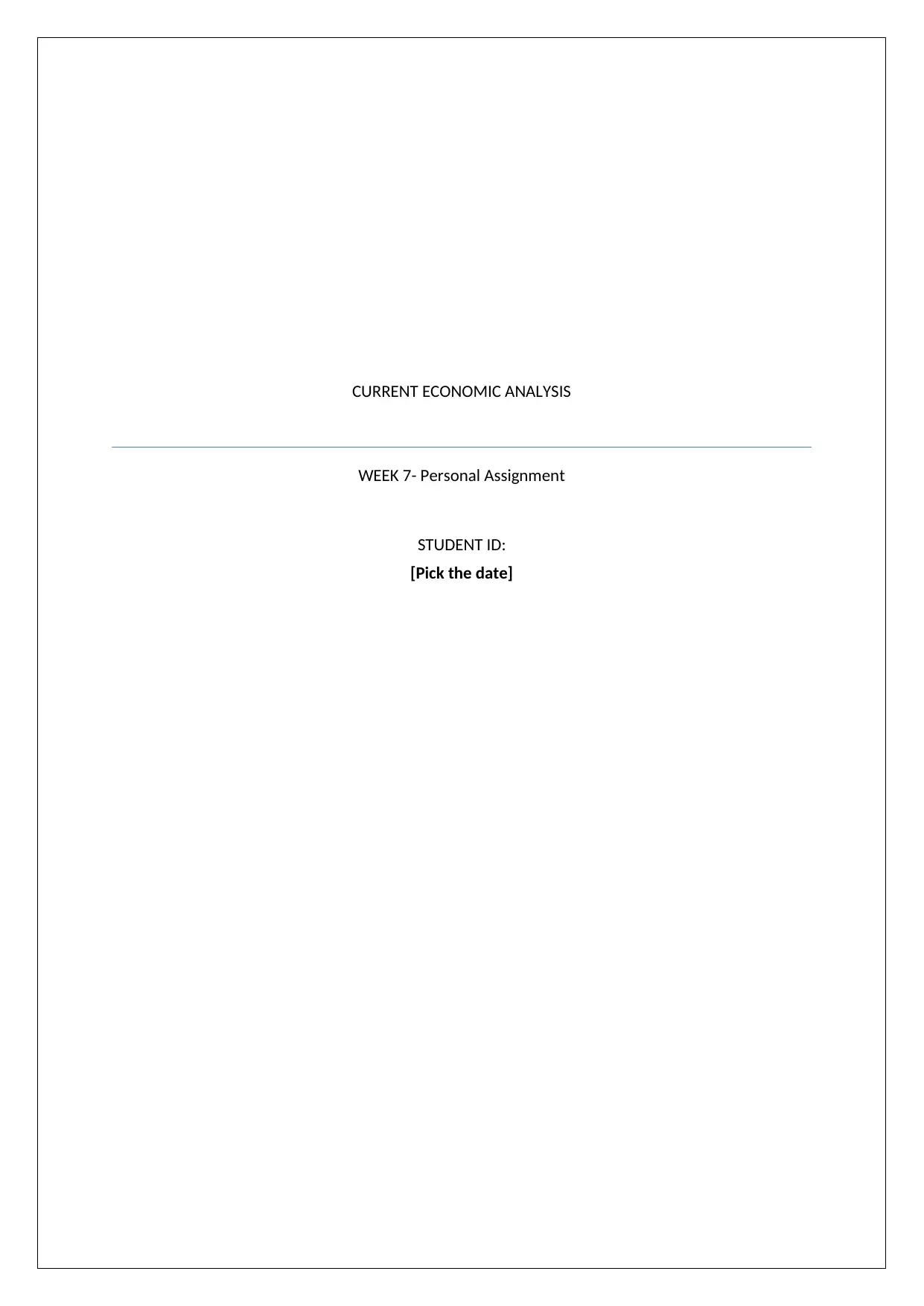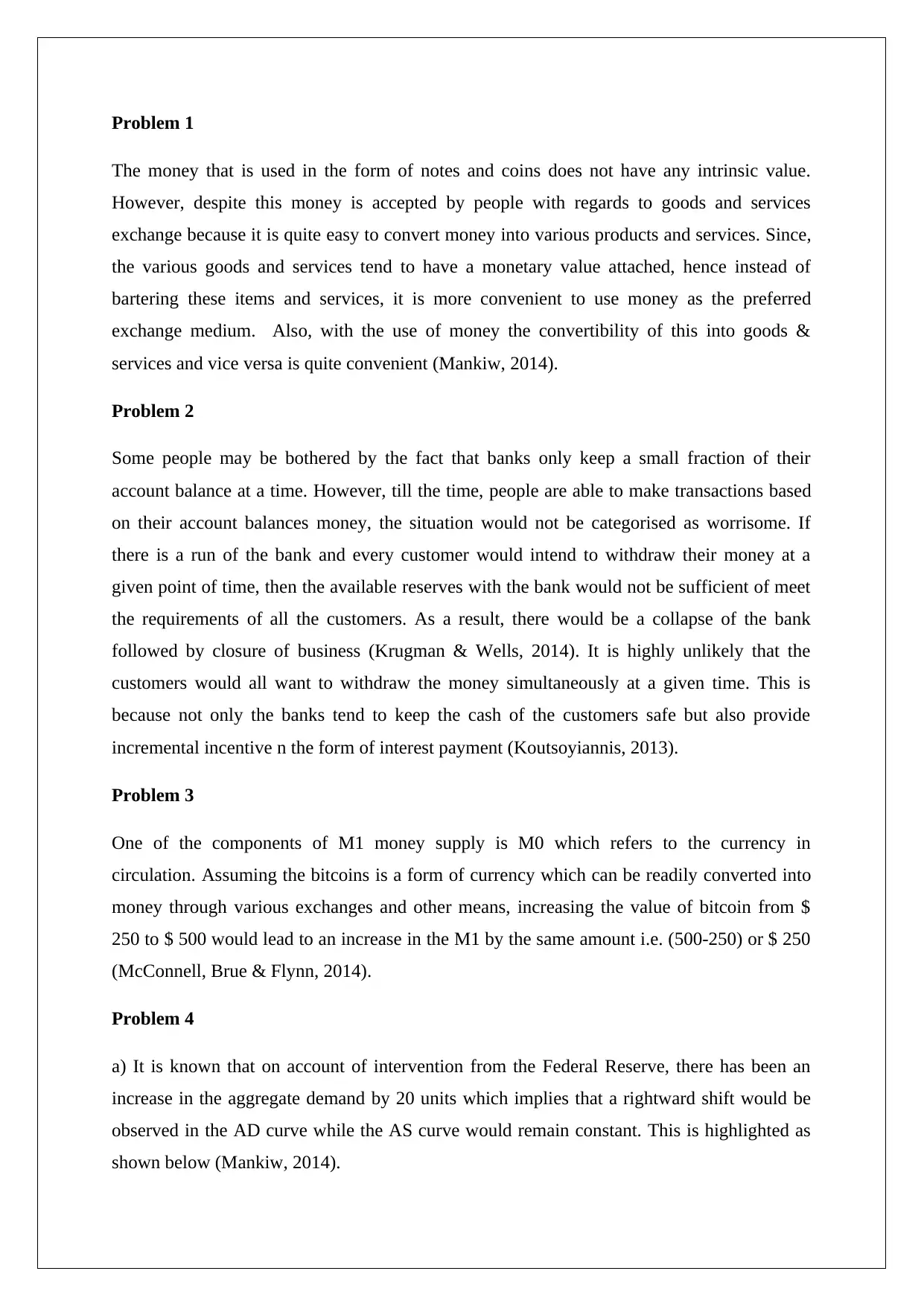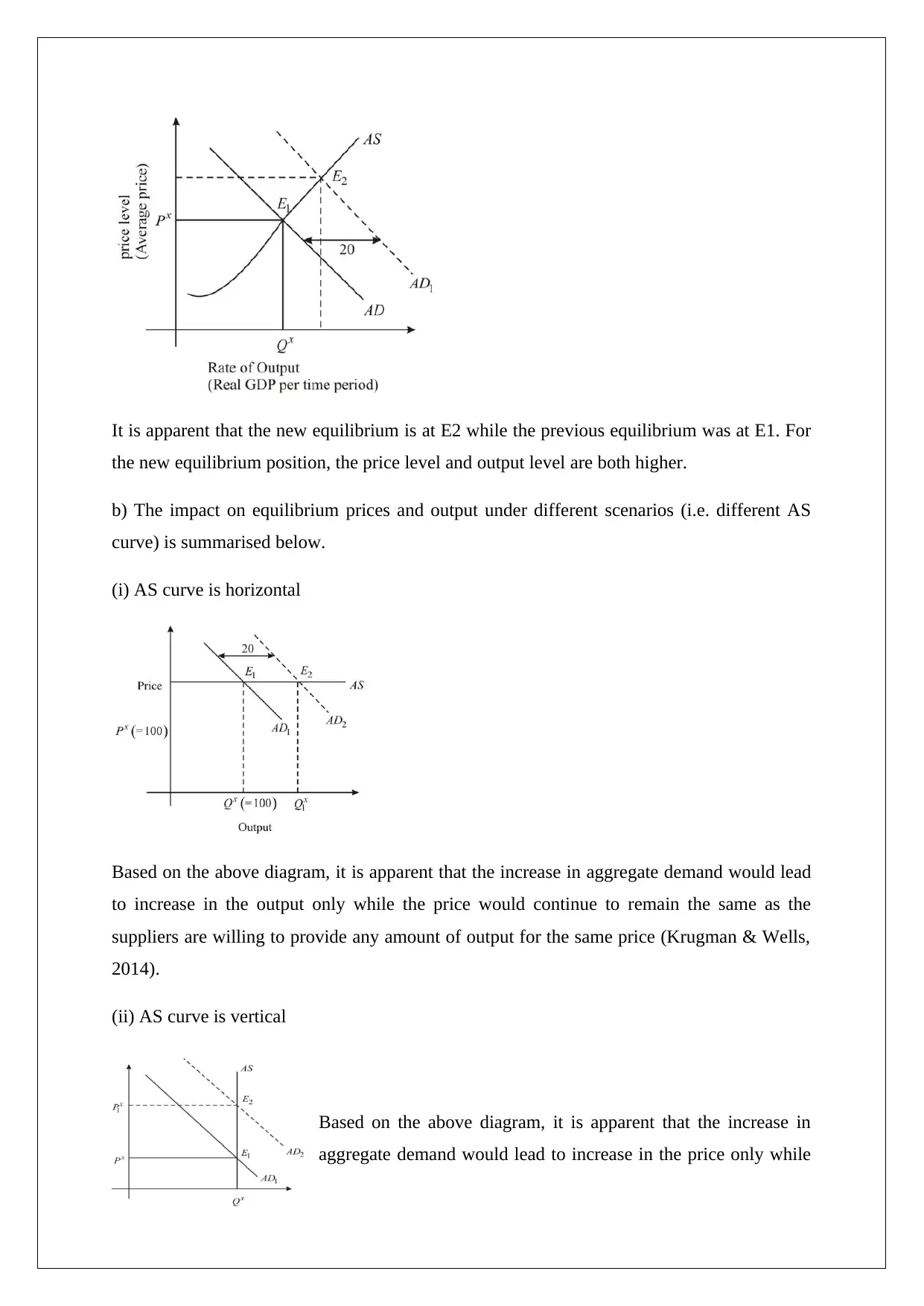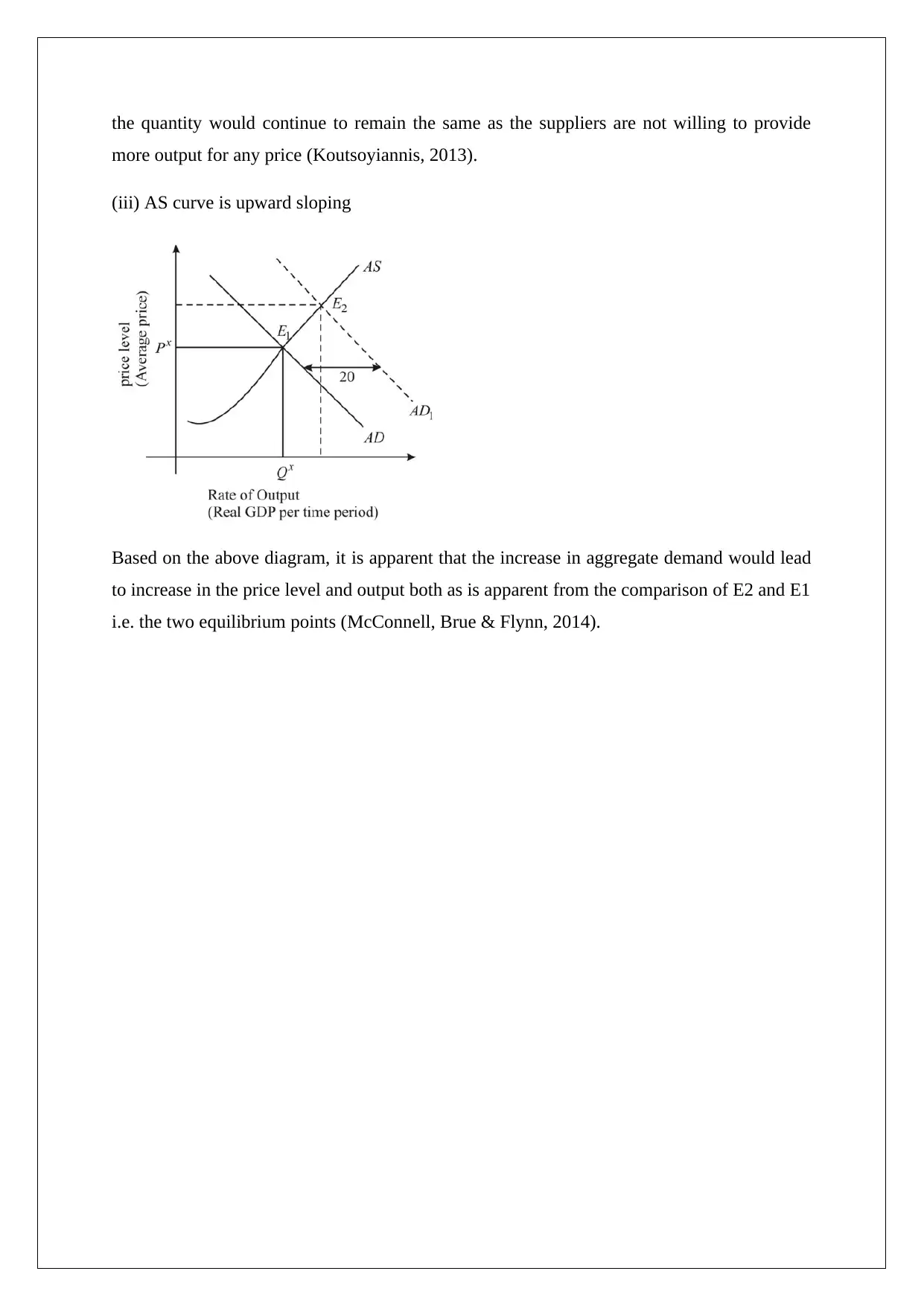BUSN 5620 - Current Economic Analysis: Solved Week 7 Assignment
VerifiedAdded on 2023/06/03
|5
|776
|305
Homework Assignment
AI Summary
This document provides solutions to a personal assignment for the Current Economic Analysis course (BUSN 5620), Week 7. It addresses questions related to the intrinsic value of money, the role of banks in maintaining fractional reserves, the impact of Bitcoin value changes on the M1 money supply, and the effects of Federal Reserve interventions on aggregate demand. The assignment further analyzes the impact on equilibrium prices and output under different aggregate supply curve scenarios, including horizontal, vertical, and upward-sloping curves, providing detailed explanations and graphical illustrations for each case.

CURRENT ECONOMIC ANALYSIS
WEEK 7- Personal Assignment
STUDENT ID:
[Pick the date]
WEEK 7- Personal Assignment
STUDENT ID:
[Pick the date]
Paraphrase This Document
Need a fresh take? Get an instant paraphrase of this document with our AI Paraphraser

Problem 1
The money that is used in the form of notes and coins does not have any intrinsic value.
However, despite this money is accepted by people with regards to goods and services
exchange because it is quite easy to convert money into various products and services. Since,
the various goods and services tend to have a monetary value attached, hence instead of
bartering these items and services, it is more convenient to use money as the preferred
exchange medium. Also, with the use of money the convertibility of this into goods &
services and vice versa is quite convenient (Mankiw, 2014).
Problem 2
Some people may be bothered by the fact that banks only keep a small fraction of their
account balance at a time. However, till the time, people are able to make transactions based
on their account balances money, the situation would not be categorised as worrisome. If
there is a run of the bank and every customer would intend to withdraw their money at a
given point of time, then the available reserves with the bank would not be sufficient of meet
the requirements of all the customers. As a result, there would be a collapse of the bank
followed by closure of business (Krugman & Wells, 2014). It is highly unlikely that the
customers would all want to withdraw the money simultaneously at a given time. This is
because not only the banks tend to keep the cash of the customers safe but also provide
incremental incentive n the form of interest payment (Koutsoyiannis, 2013).
Problem 3
One of the components of M1 money supply is M0 which refers to the currency in
circulation. Assuming the bitcoins is a form of currency which can be readily converted into
money through various exchanges and other means, increasing the value of bitcoin from $
250 to $ 500 would lead to an increase in the M1 by the same amount i.e. (500-250) or $ 250
(McConnell, Brue & Flynn, 2014).
Problem 4
a) It is known that on account of intervention from the Federal Reserve, there has been an
increase in the aggregate demand by 20 units which implies that a rightward shift would be
observed in the AD curve while the AS curve would remain constant. This is highlighted as
shown below (Mankiw, 2014).
The money that is used in the form of notes and coins does not have any intrinsic value.
However, despite this money is accepted by people with regards to goods and services
exchange because it is quite easy to convert money into various products and services. Since,
the various goods and services tend to have a monetary value attached, hence instead of
bartering these items and services, it is more convenient to use money as the preferred
exchange medium. Also, with the use of money the convertibility of this into goods &
services and vice versa is quite convenient (Mankiw, 2014).
Problem 2
Some people may be bothered by the fact that banks only keep a small fraction of their
account balance at a time. However, till the time, people are able to make transactions based
on their account balances money, the situation would not be categorised as worrisome. If
there is a run of the bank and every customer would intend to withdraw their money at a
given point of time, then the available reserves with the bank would not be sufficient of meet
the requirements of all the customers. As a result, there would be a collapse of the bank
followed by closure of business (Krugman & Wells, 2014). It is highly unlikely that the
customers would all want to withdraw the money simultaneously at a given time. This is
because not only the banks tend to keep the cash of the customers safe but also provide
incremental incentive n the form of interest payment (Koutsoyiannis, 2013).
Problem 3
One of the components of M1 money supply is M0 which refers to the currency in
circulation. Assuming the bitcoins is a form of currency which can be readily converted into
money through various exchanges and other means, increasing the value of bitcoin from $
250 to $ 500 would lead to an increase in the M1 by the same amount i.e. (500-250) or $ 250
(McConnell, Brue & Flynn, 2014).
Problem 4
a) It is known that on account of intervention from the Federal Reserve, there has been an
increase in the aggregate demand by 20 units which implies that a rightward shift would be
observed in the AD curve while the AS curve would remain constant. This is highlighted as
shown below (Mankiw, 2014).

It is apparent that the new equilibrium is at E2 while the previous equilibrium was at E1. For
the new equilibrium position, the price level and output level are both higher.
b) The impact on equilibrium prices and output under different scenarios (i.e. different AS
curve) is summarised below.
(i) AS curve is horizontal
Based on the above diagram, it is apparent that the increase in aggregate demand would lead
to increase in the output only while the price would continue to remain the same as the
suppliers are willing to provide any amount of output for the same price (Krugman & Wells,
2014).
(ii) AS curve is vertical
Based on the above diagram, it is apparent that the increase in
aggregate demand would lead to increase in the price only while
the new equilibrium position, the price level and output level are both higher.
b) The impact on equilibrium prices and output under different scenarios (i.e. different AS
curve) is summarised below.
(i) AS curve is horizontal
Based on the above diagram, it is apparent that the increase in aggregate demand would lead
to increase in the output only while the price would continue to remain the same as the
suppliers are willing to provide any amount of output for the same price (Krugman & Wells,
2014).
(ii) AS curve is vertical
Based on the above diagram, it is apparent that the increase in
aggregate demand would lead to increase in the price only while
⊘ This is a preview!⊘
Do you want full access?
Subscribe today to unlock all pages.

Trusted by 1+ million students worldwide

the quantity would continue to remain the same as the suppliers are not willing to provide
more output for any price (Koutsoyiannis, 2013).
(iii) AS curve is upward sloping
Based on the above diagram, it is apparent that the increase in aggregate demand would lead
to increase in the price level and output both as is apparent from the comparison of E2 and E1
i.e. the two equilibrium points (McConnell, Brue & Flynn, 2014).
more output for any price (Koutsoyiannis, 2013).
(iii) AS curve is upward sloping
Based on the above diagram, it is apparent that the increase in aggregate demand would lead
to increase in the price level and output both as is apparent from the comparison of E2 and E1
i.e. the two equilibrium points (McConnell, Brue & Flynn, 2014).
Paraphrase This Document
Need a fresh take? Get an instant paraphrase of this document with our AI Paraphraser

References
Koutsoyiannis, A. (2013) Modern Macroeconomics. 4th ed. London: Palgrave McMillan.
Krugman, P. & Wells, R. (2014) Macroeconomics. 3rd ed. London: Worth Publishers.
Mankiw, G. (2014) Principles of Macroeconomics 6th ed. London: Cengage Learning.
McConnell, C., Brue, S. & Flynn, S. (2014) Macroeconomics: Principles, Problems, &
Policies. 20th ed. New York: McGraw Hill Publications.
Koutsoyiannis, A. (2013) Modern Macroeconomics. 4th ed. London: Palgrave McMillan.
Krugman, P. & Wells, R. (2014) Macroeconomics. 3rd ed. London: Worth Publishers.
Mankiw, G. (2014) Principles of Macroeconomics 6th ed. London: Cengage Learning.
McConnell, C., Brue, S. & Flynn, S. (2014) Macroeconomics: Principles, Problems, &
Policies. 20th ed. New York: McGraw Hill Publications.
1 out of 5
Related Documents
Your All-in-One AI-Powered Toolkit for Academic Success.
+13062052269
info@desklib.com
Available 24*7 on WhatsApp / Email
![[object Object]](/_next/static/media/star-bottom.7253800d.svg)
Unlock your academic potential
Copyright © 2020–2026 A2Z Services. All Rights Reserved. Developed and managed by ZUCOL.


